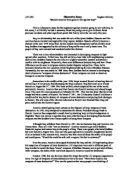Possession and attempts for possession of WMD are always a great concern to be had. Iraq has possessed WMD before, both biological and chemical, violating a cease-fire treaty signed when Iraq lost the 1991 Persian Gulf War. In 2004 a 1,500 page report has been released by Charles A. Duelfer, the CIA's top adviser on Iraqi weapons. It states proof of Hussein importing banned materials, and also declares Iraqi plans of reviving
2
WMD programs and maintaining a dual-use industrial sector that could produce illegal weapons. There are other countries, like North Korea, that may also have ownership of WMD, but Iraq was chosen as a primary target because it had exposed itself as more of a current threat that needed to be sorted out immediately. North Korea is not considered an immediate threat due to the fact it has not been involved in directly aggressive actions for about fifty years, compared to Iraq’s hostile incidents within the last decade.
Hussein had proven himself to be an unjust and untrustworthy ruthless tyrant; in many cases torturing and killing his own people. The Guardian newspaper published an
interview of eight Iraqi defectors in Dec. of 2003. They gave detailed accounts of such abuses as rape, torturing of children in front of their parents, electric shock, mutilation of body parts, burning with acid, and starvation. In some cases Hussein even used the repulsive war tactic of human shields. His aggression against neighboring countries of Iran and Kuwait had lead to the death of over 1.5 million muslims. Other abhorrent actions include the gassing of thousands of Kurds of northern Iraq in 1988, which is more evidence of possessing banned chemical weapons. Other totalitarian nations might have shown need for concern, but over and over Iraq has shown reasons for the necessity of an intervention.
Some claim the war will create new fanatics, but they don’t see that a major terrorist has already been removed from his seat of power. Hussein is charged of having a history of consulting and dealing with dangerous terrorists, the very ones that pose such a threat of a reoccurring 9/11. Documents found in Iraq's intelligence service headquarters in April, 2002; show that an Al-Qaeda envoy was invited to Baghdad in 1998 for the
3
purpose of establishing an alliance between Hussein and Bin Laden based on their mutual hatred for the United States and Israel. The documents also reveal that an Al-Qaeda envoy had previously traveled to Iraq in late 1997 from Bin Laden's former base in Sudan. Hussein had revealed himself as a terrorist supporter. He had been tied to a foiled assassination attempt in Kuwait on the first President Bush, and publicly supplies $25,000 payments to the families of any Palestinian suicide bomber. Who is to say he has
changed his ways? He has pushed his unethical practices since the first taking of his leadership rank to the day he was found hiding in a hole.
Iraqi intervention was shown to be the necessary step. Iraq had bared itself as a great risk; and despite many efforts, the UN had failed following through on demands to resolve the situation. Such occurrences can, and many times will affect all countries including the United States. A great cliché to sum it all up would be “If you want something done right, you gotta do it yourself”.
4
Works Cited
Daley, Edward L. “The Truth About Saddam’s Terrorist Connections”. March 23, 2004
ChronWatch 2004
FreeDictionary.Com. 2004. Farlex Inc. 12 Sept. 2004
.
GOVEXE.COM. 2004 National Journal Group Inc. 12 Sept. 2004
Harding, Luke. “Everyday tales of Saddam's cruelty”. December 22, 2003
Guardian Unlimited Guardian Newspapers Limited 2004
Lynch, Colum. “Bush Cites Hussein's Potential Weapons.” Washington Post.
2000-2004 The Washington Post Co. September 18, 2004
Physicians For Human Rights. 2004 Visual Communications. 12 Sept. 2004
.







